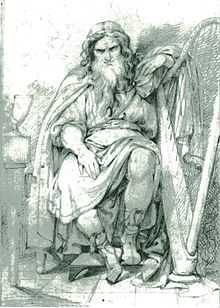Halldórr ókristni
"Unchristian" redirects here. For a discussion of anti-Christian sentiment, see Anti-Christian sentiment.
Halldórr ókristni (The Unchristian) was a Norse skald, active around the year 1000. The only thing known about him is that he was one of the court poets of Earl Eiríkr Hákonarson. Eight dróttkvætt verses by him are extant, preserved in the kings' sagas. They contain a lively description of the battle of Svolder. Heimskringla attributes at least some of those stanzas to a flokkr on Earl Eiríkr and scholars sometimes refer to them as Eiríksflokkr. The following is one of the eight verses.
|
The extant sources do not explain the epithet "ókristni" (unchristian) but it is known that although Earl Eiríkr adopted Christianity, at least nominally, he was tolerant of paganism and his court poets praised him in traditional pagan terms.[8]
Notes
- ↑ Finnur Jónsson (1912-15). Den norsk-islandske skjaldedigtning. København: Den arnamagnæanske kommission. Here taken from Eysteinn Björnsson's online edition at .
- ↑ A kenning for "sword". See .
- ↑ A kenning for "shield". See .
- ↑ Armour-ogre[ss] is a kenning for "axe". The "god of the axe" is a kenning for "warrior".
- ↑ According to the sagas the ship of Earl Eiríkr was called Barði.
- ↑ Fáfnir is a dragon; here the Long Serpent is intended.
- ↑ Finlay 2004, p. 124
- ↑ Christiansen 2002, p. 273.
References
- Halldór ókristni: Eiríksflokkr Preservation and text, including Finnur Jónsson's edition
- Christiansen, Eric (2002). The Norsemen in the Viking Age. Blackwell Publishing. ISBN 0-631-21677-4
- Finlay, Alison (editor and translator) (2004). Fagrskinna, a Catalogue of the Kings of Norway. Brill Academic Publishers. ISBN 90-04-13172-8
| ||||||||||||
